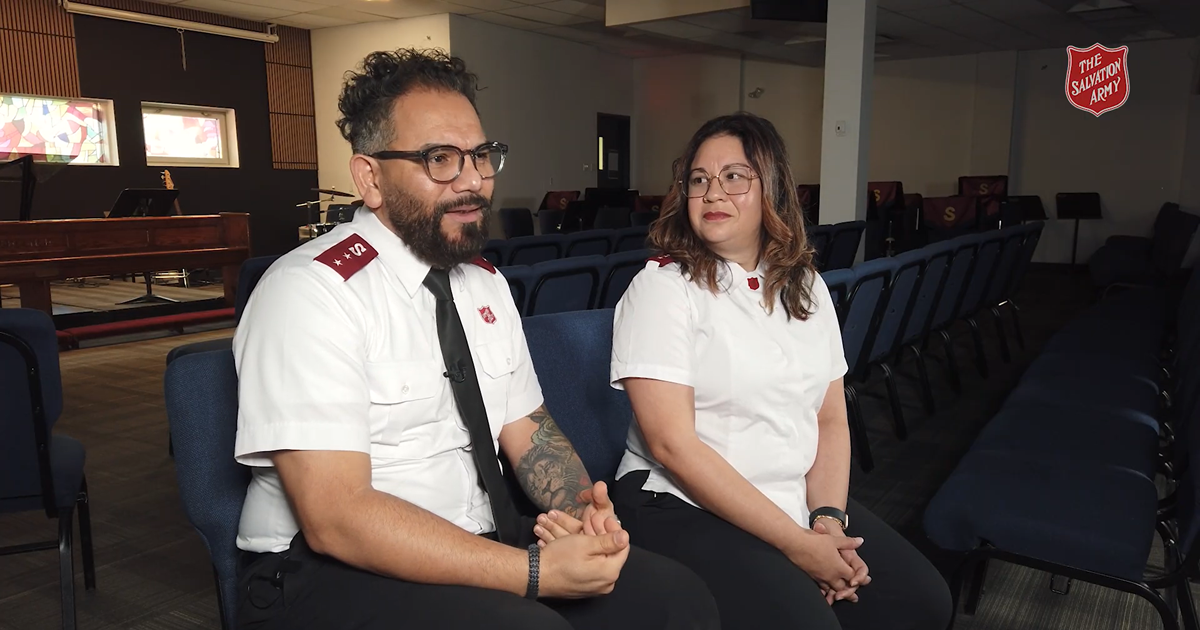Jesus stood up and cried out, “… The man who believes in me, as the Scripture says, will have rivers of living water flowing from his inmost heart.”
—John 7:37-38 J.B. Phillips
I often have an early morning walk along the Humber River in southern Ontario. Each spring, the current is full—tumbling, dancing, foaming and tearing up everything in its path. It makes me wonder if there is any connection between the river and my personal heart experience of Jesus. Jesus' promise of joy that is full, pressed down and running over (see Luke 6:38 NLT) can be true for every Salvationist.
The captivating story of the two disciples, broken and bruised from the sight of their Master hanging from the cross and meeting the resurrected Jesus on the way home to Emmaus, has within it the potential to transform darkness into light, sadness into joy and defeat into victory. Jesus did six things for Cleopas and his partner on that journey that I believe he will also do for anyone thirsty enough to drink deeply.
1. He touched them.
“Weren't our hearts glowing while he was with us on the road, and when he made the Scriptures so plain to us?” (Luke 24:32 J.B Phillips). Jesus made a habit of reaching out to touch people, heal them and set them aglow. No one felt the presence of Jesus without feeling that a fire had been kindled in their hearts.
Of course, Jesus welcomes the possibility of us reaching out to him as well. The woman who had been bleeding for 12 years said to herself, “For if I can only touch his clothes … I shall be all right” (Mark 5:28 J.B. Phillips). In the words of the song:
Thy touch has still its ancient power;
No word from thee can fruitless fall;
Hear in this solemn morning hour;
And in thy mercy heal us all.
(SASB 558)
2. He talked to them.
Our Lord speaks. Unlike the dead “gods” all around us, our God speaks at various times and in many voices.
He speaks through creation, our friends, music, good books and, most of all, through the Bible. And with his words comes the exhortation: “He that hath ears to hear, let him hear” (Matthew 11:15 KJV).
Master speak: thy servant listens,
Waiting for thy gracious word,
Longing for thy voice that cheereth;
Master, let it now be heard.
I am listening, Lord, for thee,
What has thou to say to me?
(SASB 614)
3. He taught them.
Jesus asked the two disciples what they were discussing along their walk and then proceeded to teach them. It's regrettable that the Gospel of Luke does not include at least an outline of what Jesus said in his lesson. We can only speculate.
Of all the titles that Scripture ascribes to Jesus (and there are more than 40 of them in the New Testament), he chose to be called didaskalos or “a teacher.” No teacher can compare to the excellent skills of the Master.
4. He tested them.
When they came to Emmaus, Jesus gave the impression that he meant to go on farther (see Luke 24:28). Jesus was not playing games with his two fellow travellers. He wanted to know how much they needed his presence in their lives. They literally put their hands on him and compelled him to turn into their humble cottage for the night. It was a way of testing the quality of their love for Jesus.
Every day, in one way or another, Jesus is testing us. He is asking the same question he asked Peter 2,000 years ago: “Do you love me more than these?” (John 21:15). We must resist being seduced by the spirit of the world, the flesh and the devil which daily attack us.
5. He transformed them.
Jesus went into that humble cottage with those two bewildered disciples who, even after a seven-mile walk, did not recognize him. Around the kitchen table, Jesus took bread, lifted it to heaven in thanksgiving, broke it and then gave it to the disciples. The bread is a metaphor of Christ's broken body, which provides both our salvation and sanctification.
In that moment, their eyes were opened and they recognized their friend and Saviour. Then Jesus disappeared from their sight. It was a moment they would remember for the rest of their lives—a transforming moment.
6. He trained them to testify.
Immediately, they turned their faces toward Jerusalem to find Peter and the other disciples and make their first witness. “ 'The Lord has risen and has appeared to Simon.' Then the two told what had happened on the way, and how Jesus was recognized by them when he broke the bread” (Luke 24:34-35).
Jesus did six things for the disciples on the Emmaus Road that I believe he will do for every sincere follower. If we believe in Jesus, as the Scriptures have said, out of our inner being will flow rivers of living water.
Lt-Colonel David Hammond is a retired officer who continues to be active in ministry at Toronto's Bloor Central Corps.
(Photo: © iStockphoto.com/ivan-96)
—John 7:37-38 J.B. Phillips
I often have an early morning walk along the Humber River in southern Ontario. Each spring, the current is full—tumbling, dancing, foaming and tearing up everything in its path. It makes me wonder if there is any connection between the river and my personal heart experience of Jesus. Jesus' promise of joy that is full, pressed down and running over (see Luke 6:38 NLT) can be true for every Salvationist.
The captivating story of the two disciples, broken and bruised from the sight of their Master hanging from the cross and meeting the resurrected Jesus on the way home to Emmaus, has within it the potential to transform darkness into light, sadness into joy and defeat into victory. Jesus did six things for Cleopas and his partner on that journey that I believe he will also do for anyone thirsty enough to drink deeply.
1. He touched them.
“Weren't our hearts glowing while he was with us on the road, and when he made the Scriptures so plain to us?” (Luke 24:32 J.B Phillips). Jesus made a habit of reaching out to touch people, heal them and set them aglow. No one felt the presence of Jesus without feeling that a fire had been kindled in their hearts.
Of course, Jesus welcomes the possibility of us reaching out to him as well. The woman who had been bleeding for 12 years said to herself, “For if I can only touch his clothes … I shall be all right” (Mark 5:28 J.B. Phillips). In the words of the song:
Thy touch has still its ancient power;
No word from thee can fruitless fall;
Hear in this solemn morning hour;
And in thy mercy heal us all.
(SASB 558)
2. He talked to them.
Our Lord speaks. Unlike the dead “gods” all around us, our God speaks at various times and in many voices.
He speaks through creation, our friends, music, good books and, most of all, through the Bible. And with his words comes the exhortation: “He that hath ears to hear, let him hear” (Matthew 11:15 KJV).
Master speak: thy servant listens,
Waiting for thy gracious word,
Longing for thy voice that cheereth;
Master, let it now be heard.
I am listening, Lord, for thee,
What has thou to say to me?
(SASB 614)
3. He taught them.
Jesus asked the two disciples what they were discussing along their walk and then proceeded to teach them. It's regrettable that the Gospel of Luke does not include at least an outline of what Jesus said in his lesson. We can only speculate.
Of all the titles that Scripture ascribes to Jesus (and there are more than 40 of them in the New Testament), he chose to be called didaskalos or “a teacher.” No teacher can compare to the excellent skills of the Master.
4. He tested them.
When they came to Emmaus, Jesus gave the impression that he meant to go on farther (see Luke 24:28). Jesus was not playing games with his two fellow travellers. He wanted to know how much they needed his presence in their lives. They literally put their hands on him and compelled him to turn into their humble cottage for the night. It was a way of testing the quality of their love for Jesus.
Every day, in one way or another, Jesus is testing us. He is asking the same question he asked Peter 2,000 years ago: “Do you love me more than these?” (John 21:15). We must resist being seduced by the spirit of the world, the flesh and the devil which daily attack us.
5. He transformed them.
Jesus went into that humble cottage with those two bewildered disciples who, even after a seven-mile walk, did not recognize him. Around the kitchen table, Jesus took bread, lifted it to heaven in thanksgiving, broke it and then gave it to the disciples. The bread is a metaphor of Christ's broken body, which provides both our salvation and sanctification.
In that moment, their eyes were opened and they recognized their friend and Saviour. Then Jesus disappeared from their sight. It was a moment they would remember for the rest of their lives—a transforming moment.
6. He trained them to testify.
Immediately, they turned their faces toward Jerusalem to find Peter and the other disciples and make their first witness. “ 'The Lord has risen and has appeared to Simon.' Then the two told what had happened on the way, and how Jesus was recognized by them when he broke the bread” (Luke 24:34-35).
Jesus did six things for the disciples on the Emmaus Road that I believe he will do for every sincere follower. If we believe in Jesus, as the Scriptures have said, out of our inner being will flow rivers of living water.
Lt-Colonel David Hammond is a retired officer who continues to be active in ministry at Toronto's Bloor Central Corps.
(Photo: © iStockphoto.com/ivan-96)










Leave a Comment